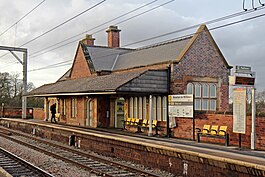Newton-le-Willows station
| Newton-le-Willows |
|
|---|---|

Newton-le-Willows railway station
|
|
| Location | |
| Place | Newton-le-Willows |
| Local authority | St Helens |
| Coordinates | 53°27′11″N 2°36′50″W / 53.453°N 2.614°WCoordinates: 53°27′11″N 2°36′50″W / 53.453°N 2.614°W |
| Grid reference | SJ593953 |
| Operations | |
| Station code | NLW |
| Managed by | Northern |
| Number of platforms | 2 |
| DfT category | E |
| Live arrivals/departures, station information and onward connections from National Rail Enquiries |
|
| Annual rail passenger usage* | |
| 2012/13 |
|
| 2013/14 |
|
| 2014/15 |
|
| 2015/16 |
|
| – Interchange | 0.131 million |
| 2016/17 |
|
| – Interchange |
|
| Passenger Transport Executive | |
| PTE | Merseytravel |
| Zone | A1 |
| History | |
| Original company | London and North Western Railway |
| Pre-grouping | London and North Western Railway |
| Post-grouping | London, Midland and Scottish Railway |
| 1845 | Opened as Newton Bridge |
| 14 June 1888 | Renamed Newton-le-Willows |
| National Rail – UK railway stations | |
| * Annual estimated passenger usage based on sales of tickets in stated financial year(s) which end or originate at Newton-le-Willows from Office of Rail and Road statistics. Methodology may vary year on year. | |
|
|
|
Newton-le-Willows railway station is a railway station in the town of Newton-le-Willows, in the north-west of England, and at the edge of the Merseytravel region (16 1⁄4 miles (26.2 km) from Liverpool Lime Street). It is situated on the northern route of the Liverpool to Manchester Line, the former Liverpool and Manchester Railway which opened in 1830. It is a busy feeder station for nearby towns which no longer have railway stations, such as Golborne, Billinge and Haydock. There is also a complimentary bus shuttle service to Haydock Park Racecourse on certain racedays.
The station was built in 1845and opened by the London and North Western Railway, originally named Newton Bridge. It was renamed Newton-le-Willows on 14 June 1888.
When first opened, it was also on the main LNWR line from London to Preston and Scotland (what is now the West Coast Main Line) thanks to a number of company mergers & acquisitions - the former North Union Railway's branch from Parkside Junction (east of the new station) to Wigan North Western had opened back in 1832 and the completion of a north to west curve round to Lowton on 1 January 1847 by the Grand Junction Railway had allowed through running to commence from London Euston and Birmingham New Street via the original Newton Junction (the modern day Earlestown), then over the L&M and onwards to Wigan and the north from that date. Within three years however, the heavily congested section of the L&M through the station was bypassed for north-south traffic with the opening of a cut-off line from Winwick Junction to Golborne, though local stopping trains between Warrington Bank Quay and Wigan continued to call thereafter. The station was also well served by trains between Manchester Exchange and Liverpool Lime Street (many of which were routed via Leigh) and also to Chester General via Warrington and the Birkenhead Joint Railway. The connections to the WCML also provided a useful diversionary route for trains to Preston & beyond from both Manchester & Liverpool - these were utilised by British Rail when they set up a Motorail terminal at the station in the 1960s, which offered through trains to Stirling & Inverness and to St Austell.
...
Wikipedia
